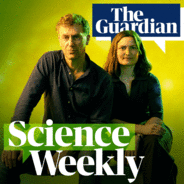The trillions of microbes living on and inside the human body are an important part of who we are, from mediating all our interactions with the environment to determining our cancer risk and influencing who we fall for. And scientists are only just beginning to decipher the species of bug we share our lives with, and how they shape us. In the second of a three-part Science Weekly mini-series, Madeleine Finlay meets Ina Schuppe Koistinen, associate professor at the Karolinska Institutet in Stockholm, and author of the book Vulva: Facts, Myths and Life-Changing Insights. Ina explains what makes the vaginal microbiome special, why it could hold the key to understanding pregnancy complications, and how we can better care for and protect it.. Help support our independent journalism at theguardian.com/sciencepod

Wissenschaft & Technik
Science Weekly Folgen
Twice a week, the Guardian brings you the latest science and environment news
Folgen von Science Weekly
300 Folgen
-
Folge vom 25.01.2024Secrets of the microbiome: the vagina
-
Folge vom 23.01.2024Secrets of the microbiome: the gutThe trillions of microbes living on and inside the human body are an important part of who we are, from mediating all of our interactions with the environment to determining our cancer risk and influencing who we fall for. And scientists are only just beginning to decipher the species of bugs we share our lives with, and how they shape us. In the first of a Science Weekly three-part mini-series, Ian Sample speaks to colorectal surgeon and researcher, James Kinross, about the miraculous world of our gut microbiome, how modern life is impacting it, and what we can do to look after it. Help support our independent journalism at theguardian.com/sciencepod
-
Folge vom 18.01.2024How to stop doomscrolling and reclaim your brainIf you’ve made a resolution to spend less time on your phone this year, help is at hand. The Guardian has launched a new newsletter, Reclaim your brain. Its co-writer and expert coach Catherine Price tells Madeleine Finlay how her own excessive phone use inspired her to investigate the science behind our relationships with our devices, and what we know about how to break the cycle. And Prof Barbara Sahakian of Cambridge University explains why many of us are drawn to looking at bad news on our phones, and what it’s doing to us. Help support our independent journalism at theguardian.com/sciencepod
-
Folge vom 16.01.2024Is guilt-free flying on the horizon?In November, a plane powered by 100% ‘sustainable’ jet fuel took off from London to New York. It was hailed by some as a milestone in reducing the carbon footprint of air travel, which accounts for about 2.5% of global CO2 emissions. Could this be the start of a greener way to fly? Madeleine Finlay speaks to Guy Gratton, associate professor of aviation and the environment at Cranfield University, to find out if the future of aviation can ever truly be guilt-free.. Help support our independent journalism at theguardian.com/sciencepod
